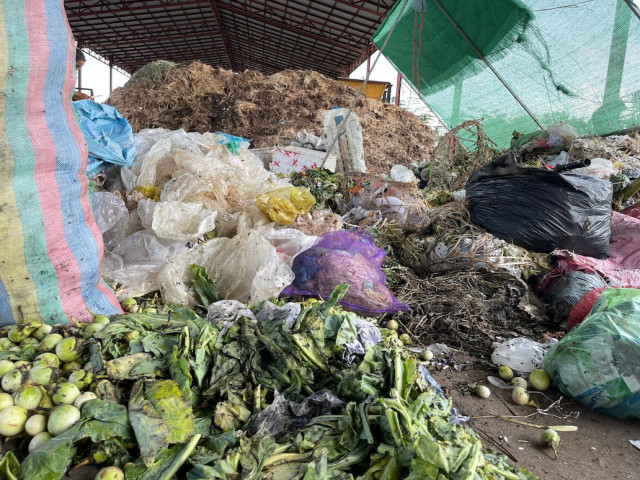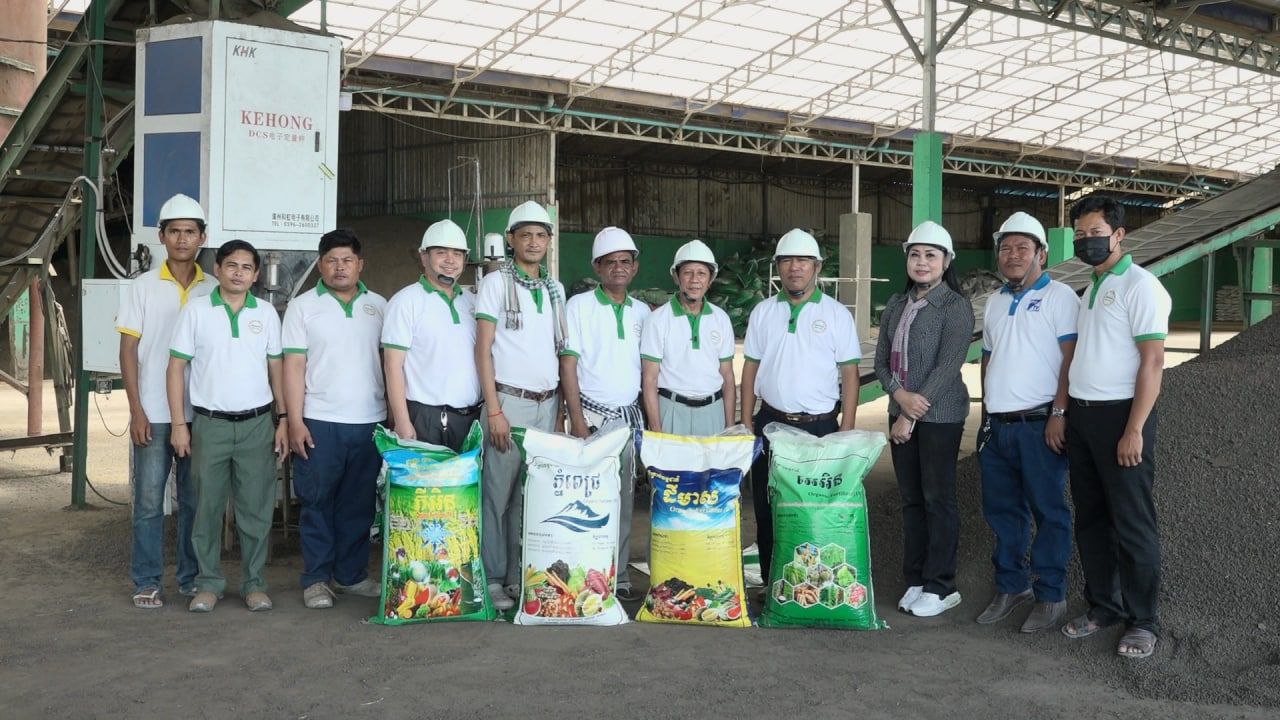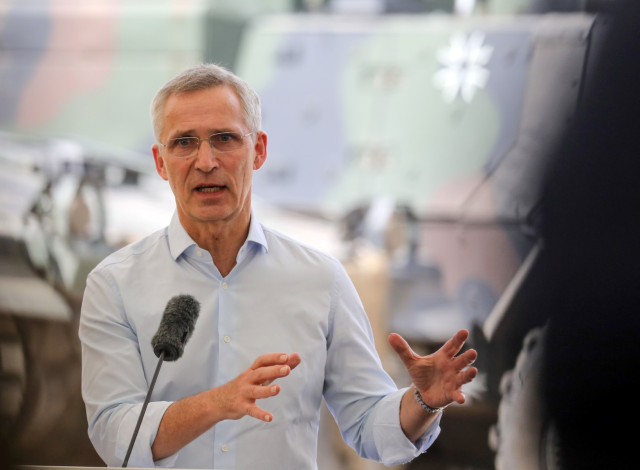Natural Fertilizers Provide Cambodia a Chance for Clean Agribusiness

- By Teng Yalirozy
- February 20, 2023 9:45 AM
PHNOM PENH – People can contribute to reducing carbon emissions by simply turning their kitchen wastes to compost, a natural fertilizer entrepreneur advised, determined to partake in fighting climate change and promoting the productivity of farmers through natural fertilizers.
Yun Sophat is the founder of Huy Yun Agriculture whose factory operates in Ksem Ksan commune, Odong district, Kampong Speu province.
Established in 2013, the factory has seen increasing support for natural fertilizers in the country, which he said is a positive movement towards a cleaner environment in the agricultural sector.
The fertilizers are made from manure and some organic wastes such as vegetables, fruits, oyster shells, cow bones, or rice bran. Sophat buys these raw materials from traders in Prey Veng province.
The factory used to only produce around 10 tons of natural fertilizer a day in its first years, but the production gradually increased to now reach 100 tons daily. Sophat would like to push it to 500 tons a day, in a move to promote clean and natural fertilizers in Cambodia.
Crucial for a clean environment and agriculture
The entrepreneur said the improper dumping of manure and perishable kitchen wastes can cause unpleasant smells and worsen the air quality. But the waste, if creatively managed, can be turned into natural fertilizers that nourish the earth and help farmers increase their crops.
“The manure, when being put into the machine, will lose its strong smell and become fertilizer,” he said, adding that through this process, waste can be turned into useful components rather than just being dumped along the streets, spoiling the environment.
 The factory used to only produce around 10 tons of natural fertilizer a day in its first years, but the production gradually increased to now reach 100 tons daily. Photo provided
The factory used to only produce around 10 tons of natural fertilizer a day in its first years, but the production gradually increased to now reach 100 tons daily. Photo provided
Heat is an essential part of producing compost. It is needed to remove moisture from wet wastes and disinfect them. But the heating process can cause smoke and air pollution.
Sophat said his factory chooses to produce heat by burning wood rather than burning used tires, even though he has to spend more on it. By doing that, less polluted smoke is produced and disseminated to the environment.
“I don’t think too much about the profits because what I’m doing now makes me happy as I can contribute to bringing change to society,” he said.
He further explained that natural fertilizer makes the soil fertile, which eventually will have an effect on both the quantity and the quality of the yields.
In addition to being a sustainable way to grow crops, natural fertilizers promote high-quality and pesticide-free food consumption.
“One point that we should know is that the compost fertilizer users don’t have to be worried about their health,” said Sophat.
Aims to contribute to reducing toxic emissions as much as possible
Around 1.4 percent of annual CO2 emissions are attributed to fertilizer production globally, mostly because of the intensive use of nitrogen fertilizers.
The use of chemical fertilizers is also a significant source of non-CO2 greenhouse gas emissions, especially nitrous oxide, which is 300 times more polluting than CO2, making the need for sustainable alternatives more urgent.
According to the Asian Development Bank, only 0.02 percent of the world's greenhouse gas emissions are produced in Cambodia. But the country’s vulnerability is increasing at the same time as its environment is threatened by human activities.
Between 1995 and 2015, Cambodia was the 13th country more at risk regarding the impacts of climate change, as per the Global Climate Risk Index, released by the German organization Germanwatch. The country has then been ranked 8th since 2016.
By 2030, loss of forestry and other land use will account for 49 percent of Cambodia’s annual greenhouse gas emissions followed by the energy sector (22 percent). With 17.5 percent, the agriculture sector comes third. Solutions must be found to allow the least polluting agriculture possible, and natural fertilizers do have a role to play.
Sophat said his goal and mission are to produce more environmental-friendly fertilizers and collect organic waste to promote clean agriculture. He also wants to help Cambodian farmers to gain more from their farming business by using natural fertilizers.
“I will try to produce compost and natural fertilizers as much as I can,” he said. “Producing 500 tons of fertilizers would require 1,000 to 2,000 tons of organic waste intrants. This is as much waste that is no longer in nature.”
More than 10,000 tons of waste are produced in Cambodia every day, which amounts to more than four million tons annually. Of this waste, about 60 percent is organic waste, 20 percent is plastic waste, and 10 percent is general waste, the Environment Ministry Spokesperson Neth Pheaktra said in August 2022 during a press conference reviewing the work of the ministry over the past five years.
Last year, Cambodia revealed its long-term plan to become carbon neutral by 2050, making it the third least developed nation to set such an ambitious goal.
Be a model and promote farmers
Sophat stated that this new ambition is likely to boost the use of natural fertilizers as they can be a very good alternative to their chemical counterparts, whose impact on the environment is much higher.
In addition, he is also teaching people in the community to make compost fertilizers from their kitchen waste so that they can grow small-scale farming at home for their consumption.
He said he has always loved the idea of houses surrounded by crops and nature, with no effect on health and the environment.
“I want farmers to think of the environment and the consumers. Gaining profit while affecting others’ well-being is not good,” he said.
Sophat graduated with an associate degree in agriculture from Prek Leap National School of Agriculture in 1999. He continued his studies with a Bachelor’s degree in Agriculture at Kasetsart University, Bangkok, Thailand. He then was given the chance to pursue his Master’s degree in Australia. Now, Huy Yun Agriculture hires about 200 staff.
He advised that farmers should strive to produce their own natural fertilizers while doing business for the greatest good.
“If you learn, you will know. Take failure as an experience and improvement and find new discoveries to develop forward,” said Sophat.
The Asian Development Bank will hold conference called Southeast Asia Development Symposium (SEADS) 2023, "Imagining a Net Zero ASEAN," on Mar. 30, which will bring together thought leaders, decision makers, and climate action advocates from government, industry, academia, and the development sector to discuss innovative solutions that can help countries focus on becoming net zero economies and rebound from the COVID-19 crisis.
SEADS 2023 will examine how the region can harness new green, innovative, and cost-effective approaches; adopt new technological solutions; accelerate the availability of finance; and deploy other effective measures to support decarbonization in a wide range of sectors while revitalizing economies.















